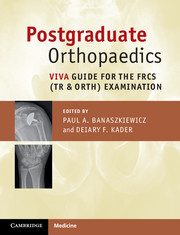Book contents
- Frontmatter
- Contents
- List of Contributors
- Foreword
- Preface
- Section 1 The FRCS (Tr & Orth) Oral Examination
- Section 2 Adult Elective Orthopaedics and Spine
- Chapter 2 Hip structured oral questions
- Chapter 3 Knee structured oral questions
- Chapter 4 Foot and ankle structured oral questions
- Chapter 5 Spine structured oral questions
- Chapter 6 Shoulder and elbow structured oral questions
- Chapter 7 Orthopaedic oncology
- Section 3 Trauma
- Section 4 Hand and Upper Limb/Children's Orthopaedics
- Section 5 Applied Basic Science
- Section 6 Diagrams for the FRCS (Tr & Orth)
- Index
- Plate Section
Chapter 5 - Spine structured oral questions
from Section 2 - Adult Elective Orthopaedics and Spine
Published online by Cambridge University Press: 05 November 2012
- Frontmatter
- Contents
- List of Contributors
- Foreword
- Preface
- Section 1 The FRCS (Tr & Orth) Oral Examination
- Section 2 Adult Elective Orthopaedics and Spine
- Chapter 2 Hip structured oral questions
- Chapter 3 Knee structured oral questions
- Chapter 4 Foot and ankle structured oral questions
- Chapter 5 Spine structured oral questions
- Chapter 6 Shoulder and elbow structured oral questions
- Chapter 7 Orthopaedic oncology
- Section 3 Trauma
- Section 4 Hand and Upper Limb/Children's Orthopaedics
- Section 5 Applied Basic Science
- Section 6 Diagrams for the FRCS (Tr & Orth)
- Index
- Plate Section
Summary
Introduction
What could be more central to orthopaedics than the ‘orthos’ (correct or straight) and ‘paideion’ (child) of paediatric spinal deformity surgery? Despite this, the spine viva is often an area where candidates for the FRCS (Tr & Orth) exam feel less well prepared. The subject area of orthopaedic spine surgery is broad and rapidly evolving. This makes it a fascinating area to study, but it also presents candidates for the FRCS exam with a daunting task if an exhaustive knowledge is sought. Viva questions tend to be one of two types. Either they are sufficiently ‘core’ that any consultant orthopaedic surgeon should know about the condition, or they are general orthopaedic questions that are being applied to the spine. In order to cover the breadth of material required this chapter will be succinct, covering core spine topics in sufficient depth to provide the candidate with a framework with which to tackle spine questions. Areas that will be covered include:
Tumours.
Infection.
The prolapsed intervertebral disc.
Scoliosis.
Spinal stenosis.
Spondylolisthesis.
Trauma.
Notes on various other viva scenarios.
- Type
- Chapter
- Information
- Postgraduate OrthopaedicsViva Guide for the FRCS (Tr & Orth) Examination, pp. 69 - 85Publisher: Cambridge University PressPrint publication year: 2012



